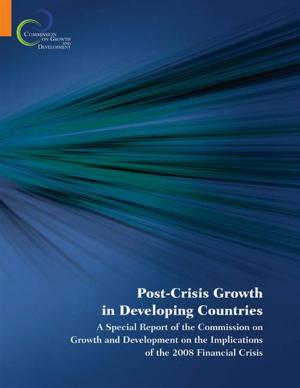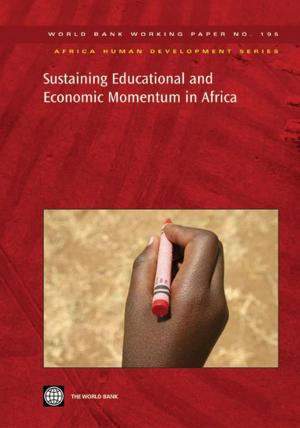| Author: | World Bank | ISBN: | 9780821383162 |
| Publisher: | World Bank | Publication: | May 4, 2010 |
| Imprint: | Language: | English |
| Author: | World Bank |
| ISBN: | 9780821383162 |
| Publisher: | World Bank |
| Publication: | May 4, 2010 |
| Imprint: | |
| Language: | English |
What is the human cost of the global economic crisis? This year's Global Monitoring Report, The MDGs after the Crisis, examines the impact of the worst recession since the Great Depression on poverty and human development outcomes in developing countries. Although the recovery is under way, the impact of the crisis will be lasting and immeasurable. The impressive precrisis progress in povertyreduction will slow, particularly in low-income countries in Africa. No household in developing countries is immune. Gaps will persist to 2020. In 2015, 20 million more people in Sub-Saharan Africa will be in extreme poverty and 53 million more people globally. Even households above the 1.25-a-daypoverty line in higher-income developing countries are coping by buying cheaper food, delaying other purchases, reducing visits to doctors, working longer hours, or taking multiple jobs.The crisis will also have serious costs on human development indicators:• 1.2 million more children under age five and 265,000 more infants will die between 2009 and 2015.• 350,000 more students will not complete primary education in 2015.• 100 million fewer people will have access to safe drinking water in 2015 because of the crisis.History tells us that if we let the recovery slide and allow the crisis to lead to widespread domestic policy failures and institutional breakdowns in poor countries, the negative impact on human development outcomes, especially on children and women, will be disastrous. The international financial institutions and international community responded strongly and quickly to the crisis, butmore is needed to sustain the recovery and regain the momentum in achieving the Millennium Development Goals (MDGs). Developing countries will also need to implement significant policy reforms and strengthen institutions to improve the efficiency of service delivery in the face of fiscal constraints. Unlike previous crises, however, this one was not caused by domestic policy failure in developing countries. So better development outcomes will also hinge on a rapid global economic recovery that improves export conditions, terms-oftrade, and affordable capital flows as well as meeting aid commitments to low-income countries.Global Monitoring Report 2010, seventh in this annual series, is prepared jointly by the World Bank and the International Monetary Fund. It provides a development perspective on the global economic crisis and assesses the impact on developing countries their growth, poverty reduction, and other MDGs. Finally, it sets out priorities for policy responses, both by developing countries and by the international community.
What is the human cost of the global economic crisis? This year's Global Monitoring Report, The MDGs after the Crisis, examines the impact of the worst recession since the Great Depression on poverty and human development outcomes in developing countries. Although the recovery is under way, the impact of the crisis will be lasting and immeasurable. The impressive precrisis progress in povertyreduction will slow, particularly in low-income countries in Africa. No household in developing countries is immune. Gaps will persist to 2020. In 2015, 20 million more people in Sub-Saharan Africa will be in extreme poverty and 53 million more people globally. Even households above the 1.25-a-daypoverty line in higher-income developing countries are coping by buying cheaper food, delaying other purchases, reducing visits to doctors, working longer hours, or taking multiple jobs.The crisis will also have serious costs on human development indicators:• 1.2 million more children under age five and 265,000 more infants will die between 2009 and 2015.• 350,000 more students will not complete primary education in 2015.• 100 million fewer people will have access to safe drinking water in 2015 because of the crisis.History tells us that if we let the recovery slide and allow the crisis to lead to widespread domestic policy failures and institutional breakdowns in poor countries, the negative impact on human development outcomes, especially on children and women, will be disastrous. The international financial institutions and international community responded strongly and quickly to the crisis, butmore is needed to sustain the recovery and regain the momentum in achieving the Millennium Development Goals (MDGs). Developing countries will also need to implement significant policy reforms and strengthen institutions to improve the efficiency of service delivery in the face of fiscal constraints. Unlike previous crises, however, this one was not caused by domestic policy failure in developing countries. So better development outcomes will also hinge on a rapid global economic recovery that improves export conditions, terms-oftrade, and affordable capital flows as well as meeting aid commitments to low-income countries.Global Monitoring Report 2010, seventh in this annual series, is prepared jointly by the World Bank and the International Monetary Fund. It provides a development perspective on the global economic crisis and assesses the impact on developing countries their growth, poverty reduction, and other MDGs. Finally, it sets out priorities for policy responses, both by developing countries and by the international community.















